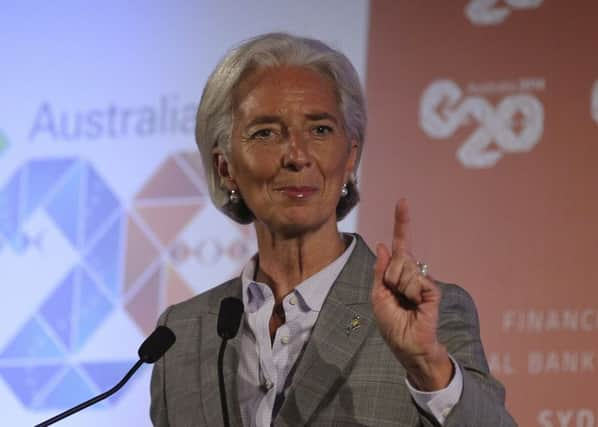G20 agrees ‘ambitious’ target for global output


Progress on returning economic growth to pre-crisis levels has been hampered by austerity measures across Europe and a slowdown in China, but the G20 finance leaders said they were encouraged by signs of improvement in Japan, the UK and US “and the resumption of growth in the euro area”.
Official figures show that the eurozone’s economy grew by 0.3 per cent in the final three months of 2013, up from 0.1 per cent in the previous quarter, helped by faster-than-expected expansion in France and Germany. Output in the UK rose 0.7 per cent in the fourth quarter, according to initial estimates.
Advertisement
Hide AdAdvertisement
Hide AdHowever, the G20 finance chiefs stressed in a joint statement at the end of their two-day meeting in Sydney that there was “no room for complacency” and the global economy remains some way off achieving strong, sustainable and balanced growth.
The communiqué added: “We will develop ambitious but realistic policies with the aim to lift our collective GDP by more than 2 per cent above the trajectory implied by current policies over the coming five years.”
Australian treasurer Joe Hockey, who hosted the meeting, heralded the goal as “unprecedented”, but Germany’s finance minister, Wolfgang Schäuble, sounded a note of caution, warning that the results “cannot be guaranteed by politicians”.
The growth target came as Ben Broadbent, a member of the Bank of England’s monetary policy committee, said the UK economy was “finally moving out of intensive care” and wages could soon start making up some of the ground lost to inflation, which slowed below the Bank’s target to 1.9 per cent last month.
Writing in a Sunday newspaper, Broadbent said: “It will be hard to get a strong and balanced recovery if demand in continental Europe again peters out. It will be hard to get any sort of sustained recovery if productivity continues to stagnate.
“But there are upside risks, too. After all, few expected the economy to grow as quickly as it did last year. It is reasonable to expect both a continued recovery and, after a difficult few years, growth in real wages as well.”
World GDP was about $72tn in 2012, and the G20 goal of boosting output by more than $2tn – creating ten of millions of jobs in the process – is equivalent to what Russia, the world’s eighth-largest economy, produces in a year.
The International Monetary Fund has forecast that the world economy will grow 3.7 per cent this year, rising to 3.9 per cent in 2015, and managing director Christine Lagarde said the G20 target was “attainable”.
Advertisement
Hide AdAdvertisement
Hide AdShe added: “Measures to support investment, boost trade and promote competition will be essential for more sustainable and robust growth.”
The G20 ministers said they recognised the need for many advanced economies to keep borrowing costs low while the recovery takes hold, but interest rates should “normalise” in due course, depending on the outlook for inflation.
“This eventual development would be positive for the global economy and reduced reliance on easy monetary policy would be beneficial in the medium term for financial stability,” they said.